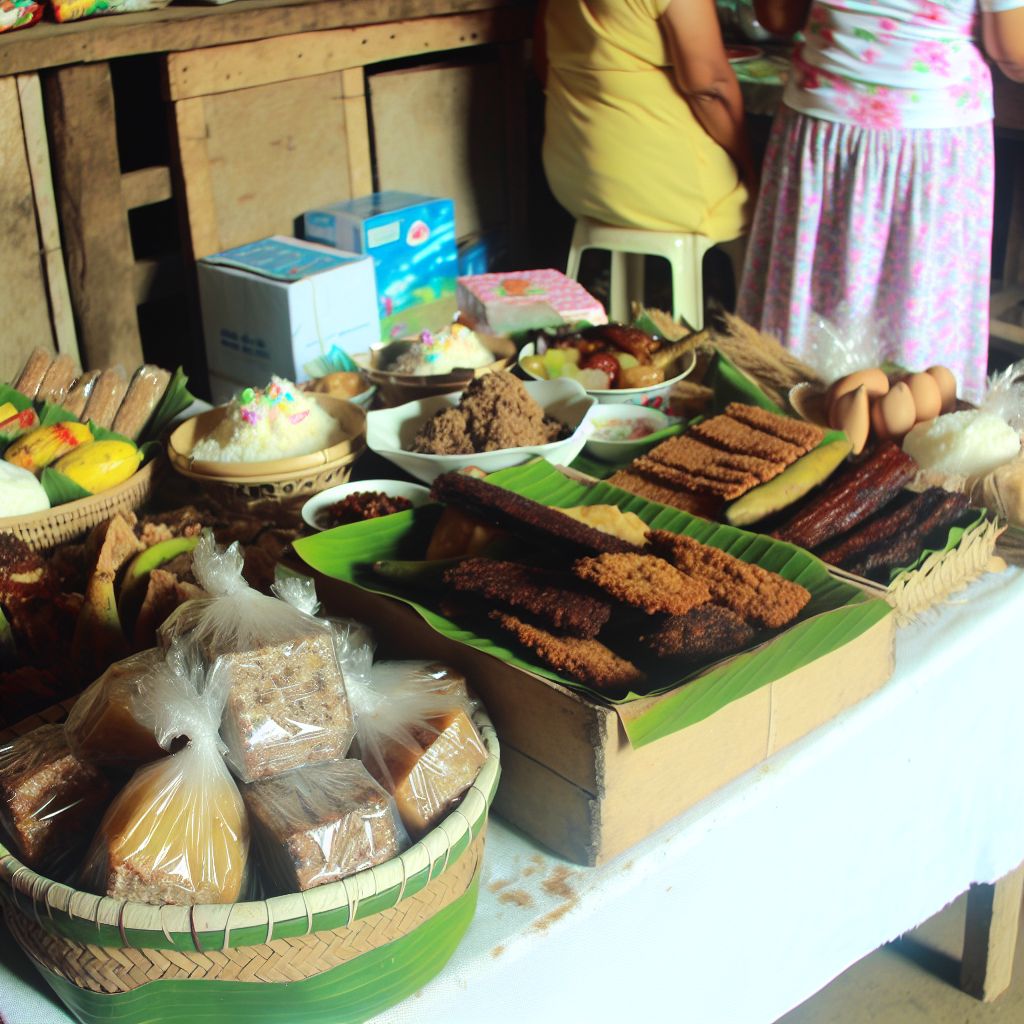Deutsch: Pasalubong / Español: Pasalubong / Português: Pasalubong / Français: Pasalubong / Italiano: Pasalubong
Pasalubong refers to a Filipino tradition involving the giving of gifts or souvenirs, often food items, brought home by someone who has traveled from one place to another. It is a deeply rooted practice in Filipino culture, symbolizing thoughtfulness, affection, and the sharing of one's travels with family, friends, and colleagues. In the food context, pasalubong often consists of local delicacies or specialties from a particular region, town, or country that are not readily available in the recipient's area.
Description

Pasalubong can range from simple snacks and sweets to elaborate food items, reflecting the richness and diversity of Filipino cuisine and regional specialties. This tradition is a way of connecting and re-establishing ties, emphasizing the importance of family and community relationships in Filipino culture. The act of giving pasalubong is not just about the item itself but also the gesture of remembering and sharing a piece of one's journey with others.
The types of food given as pasalubong are varied and often include preserved or non-perishable items such as dried mangoes, Polvoron (powdered milk candy), otap (puff pastry), and various other regional sweets and treats. These items are chosen for their long shelf life, ease of transport, and their unique representation of the place visited.
Application Areas
Pasalubong is practiced across all regions of the Philippines and by Filipinos living abroad when they return home or send packages to the Philippines. It is a common practice among travelers, OFWs (Overseas Filipino Workers), and Filipinos returning from local or international vacations to bring back pasalubong for their loved ones.
Well-Known Examples
Some popular pasalubong items include:
- Pili Nuts from Bicol, known for their buttery taste and unique texture.
- Mangorind, a candy made from Mango and tamarind, popular in Cebu.
- Barquillos, thin, rolled wafers that are a delicacy in Iloilo.
- Buko Pie, a coconut-filled pie that is a favorite pasalubong from Laguna.
- Dried Mangoes, especially from Cebu, renowned for their sweetness and chewy texture.
Treatment and Risks
Pasalubong items, especially food, are generally selected for their durability and longevity, minimizing the risk of spoilage during travel. However, it is important to store and handle these food items properly to maintain their quality and safety until they are given and consumed. The selection of pasalubong should consider any dietary restrictions or allergies of the recipients.
Similar Terms or Synonyms
- Souvenir: While souvenir is a more general term that can include any item bought or obtained during a trip, pasalubong specifically denotes items intended for gifting upon return.
- Gift: A broader term that encompasses pasalubong but lacks the cultural and travel-specific connotations.
Summary
Pasalubong is a cherished tradition in Filipino culture, embodying the values of generosity, thoughtfulness, and community. Through the simple act of giving food items as pasalubong, Filipinos strengthen bonds with their loved ones, sharing not only the flavors of their travels but also a sense of warmth and connection that is central to Filipino identity and hospitality.
--
Related Articles to the term 'Pasalubong' | |
| 'Tindahan' | ■■■■■■■■ |
| In the food context, Tindahan refers to a small store or shop in the Philippines that sells a variety . . . Read More | |
| 'Indian' | ■■■■■■■■ |
| Indian in the food context refers to the culinary traditions and dishes originating from India, characterized . . . Read More | |
| 'African' at travel-glossary.com | ■■■■■■■■ |
| African in the context of travel refers to anything associated with the continent of Africa, including . . . Read More | |
| 'Palaharam' | ■■■■■■■■ |
| Palaharam is a term commonly used in the Indian subcontinent, particularly in the southern states of . . . Read More | |
| 'India' | ■■■■■■■■ |
| India is renowned for its rich and diverse culinary traditions, which are deeply rooted in the country\'s . . . Read More | |
| 'Sapin-Sapin' | ■■■■■■■ |
| Sapin-Sapin: Sapin-sapin, a delightful and visually striking Filipino dessert, is a true testament to . . . Read More | |
| 'Lumpia' | ■■■■■■■ |
| Lumpia is a beloved dish in Filipino cuisine, and it holds a special place on dining tables around the . . . Read More | |
| 'Tokneneng' | ■■■■■■■ |
| Tokneneng is a popular Filipino street food consisting of boiled eggs coated in an orange-coloured batter, . . . Read More | |
| 'Bergamo' at travel-glossary.com | ■■■■■■■ |
| Bergamo is a major city in Italy. This city is on position 204 (194, 402) in our monthly survey. . . . . . Read More | |
| 'Cuisine' | ■■■■■■■ |
| Cuisine: A cuisine is a style of cooking characterized by distinctive ingredients, techniques and dishes, . . . Read More | |
